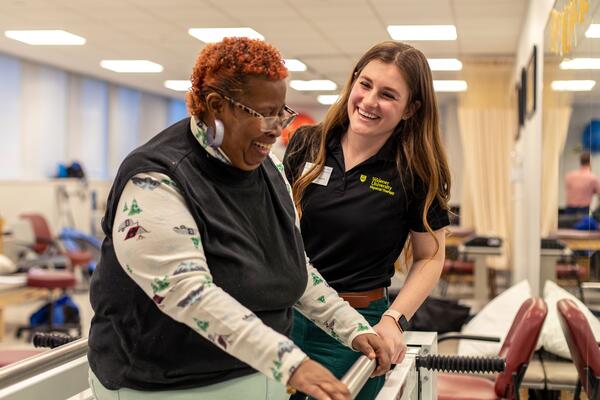Experiential learning opportunities provide students with a space to connect in-classroom learning to real-world situations. A student-run clinic at Widener University provides health professions students with hands-on learning and career experiences while supporting community health and well-being for Chester, Pa., residents.
The Chester Community Clinic was founded in 2009 for physical therapy services but has since expanded to cover other health and wellness services, including occupational therapy and speech-language pathology. The clinic gives students studying those fields leadership opportunities, experience working with diverse clients and the confidence to tackle their professional careers.
What’s the need: Before the clinic was established, physical therapy students at Widener would volunteer at a pro bono clinic in nearby Philadelphia. But students pushed for a clinic within Chester, which is considered a primary care health professional shortage area, meaning it lacks enough providers to serve the local population.
For some patients, a lack of health insurance can impede their ability to receive care. In Pennsylvania, 5.4 percent of residents are without private or public health insurance, roughly two percentage points lower than the national average. The clinic addresses gaps in health care by providing services for free while educating future medical professionals.
How it works: The clinic is led by a board of 12 to 14 students from each class and supervised by faculty and community members who are licensed physical therapists. Students begin service in their second semester of the program and participate in the clinic until their final clinical placement.
Most clients are referred by a physician but have been turned away from local PT clinics due to a lack of health insurance or because they exceeded the allotted insurance benefits for PT.
During appointments, students provide direct physical therapy services to patients, including making care plans, walking them through exercises and creating medical records.
Over the years, the clinic has expanded to include occupational therapy, speech-language pathology, clinical psychology and social work services. In 2024, Widener created a Community Nursing Clinic to provide pro bono services as well.
All students studying physical therapy, occupational therapy and speech-language pathology at Widener volunteer at the clinic as part of the program requirements. PT students are required to serve a minimum of three evenings per semester; board members typically serve more hours.
The clinic’s multifaceted offerings increase opportunities for students to work across departments, engaging with their peers in other health professions to establish interdisciplinary plans for care.
Free Talent
Other colleges and universities offer pro bono student services to support community members and organizations:
- Gonzaga University has a student-led sports consulting agency that offers strategy ideas and tools to sports brands and teams.
- Utah Valley University students can intern with a semester-long program that provides digital marketing to businesses in the region.
- American University’s Kogod School of Business has a business consulting group that provides students with project-based consulting experience.
- Carroll University faculty and students in the behavioral health psychology master’s program run a free mental health clinic for those in the area.
The impact: Since the clinic began in 2009, students have provided over 12,000 physical therapy appointments to community members, worth about $1.3 million in costs, according to a 2024 press release from the university.
A 2017 program evaluation, published in the Internet Journal of Allied Health Sciences and Practice, found that PT students who served in the pro bono clinic felt more equipped to launch into clinical work. They were prepared to manage documentation, use clinical reasoning and engage in interprofessional communication.
A 2020 study of the clinic also found that students performed better than expected in cultural competence, perhaps due to their experience engaging with clients from a variety of ethnicities, socioeconomic backgrounds, health literacy levels, religions and languages.
Both Widener and students in the health professions continue to support the development of other pro bono clinics. The class of 2015 created The Pro Bono Network, facilitating advancement of student-run pro bono services among 109 member institutions across the country. This past spring, Widener’s annual Pro Bono Network Conference welcomed 250 individuals working at or affiliated with pro bono clinics, and featured 32 student leaders presenting their work.
How do your students gain hands-on experience and give back? Tell us more.
